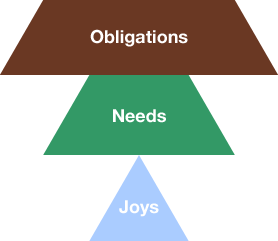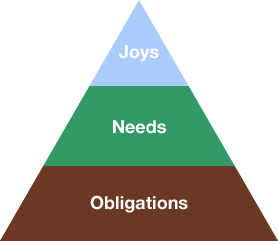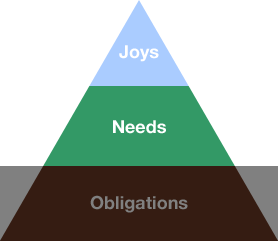Moving from Poverty to Abundance
Last week I described how money wasn’t the root of all evil, but loving it causes challenges. Frequently we actually fear it, because we see how it seems to control us and force us to fulfill obligations we dont’t desire. This week, I’ll describe how to move from a space of fearing and wishing for money to a space of allowing it to simply be a useful tool.
The biggest difference between a poverty mindset and an abundance mindset are four words:
“I can create more.”
If you ever believe you can’t, ask yourself how old you are. However old you are, are you alive? If so, then you’ve created enough to make it this far. There’s no strong reason to believe that you won’t continue to make it, challenging as it may be. The evidence says otherwise.
Once that settles in, the real question is, “How do I make it easier?”
Recognizing worth
One of the biggest challenges we face is being able to differentiate between what we need, what we want, and what others say we want. Left to our own devices, we may find that we really don’t need much in the world. We may find that the world offers most of what we want, simply by being part of it.
And yet we also find ourselves being told that we need additional items to increase our self-worth. We may find ourselves buying new phones, new clothes, new cars, all in an effort to increase the value we see in ourselves: our attractiveness, our power, our ingenuity, our status. We may purchase items to keep ourselves from being present in the “slow world” or reality (compared to the speed of entertainment).
But when we get caught up in buying more than we can afford, it frequently happens because we forgot a simple truth:
Everything’s worthless.
Intrinsic versus extrinsic value
Before you write me off as a lunatic for saying that everything’s worthless, let me describe the difference between intrinsic and extrinsic value. Intrinsic value is the value something has based solely upon its presence. Extrinsic value is the value something has based upon the meaning we’ve applied to it. Money has extrinsic value, for example, because we as a society have defined it as the medium of exchange for goods and services.
When we differentiate between intrinsic and extrinsic value, we start to see something odd. We come to realize that we apply meaning to everything. We come to realize that, really, nothing has meaning simply because it is there.
Even the things we call necessities – air, water – have no value simply by being air and water. We know that because, when we have gorged ourselves on water, we suddenly find that we do not feel a need to drink more water. Our circumstances have changed since before we started drinking water. It’s value to us has changed, leaving it as something we don’t need at the moment.
When we come to realize that value is defined by how we perceive something, it changes our perceptions on how we spend our money. We can differentiate between the meaning we apply to a product or service, and the meaning someone has applied for us.
Buying the unsalable
Once we recognize the difference between the meaning we apply to a product, and the meaning the advertisement places on the product, it becomes much easier to know the difference between a purchase that we are making, and a purchase the advertiser is making for us.
Advertising works based upon promising to fill a need. Most products are advertised to fill needs that cannot be filled by anyone but ourselves. Want to feel more attractive? Buy our product. Want to feel more manly or feminine? Buy our product. Want to look savvier? Buy our product. Want to feel more confident? Buy our product.
Each of these are attributes that we were born with, but were told we didn’t or couldn’t have. Our bodies are naturally attractive when we enjoy living inside of them. If we do not enjoy that experience, the job is to reconnect with our bodies, listen to them, and take care of them. In turn, they will take care of us and awaken ourselves to their natural beauty.
A product sold to fulfill a quality is attempting to create a market for something that cannot be sold.
Reclaiming our sense of value
Once we recognize the difference between products that meet our needs and products that attempt to fill a quality, we can detach from marketing-as-value-maker and focus on marketing-as-information-provider. From that perspective, it becomes suddenly quite clear whether or not something is valuable to us.
Axe body wash, for example, is a product for cleaning your body. It has a fragrance. Its advertising, however, would have us believe that it instantly makes men into objects of desire for women. (They are certainly saying this with their tongues firmly in their cheeks, but message still sticks.) It attempts to give additional meaning – additional extrinsic value – to their product.
The question they want me to ask is, “Will I feel sexier using this product?” and they answer, “Of course you will!” And if we feel we need external help to create that, then they have us hooked.
If we divorce the qualities it tries to fill from the product that it is, we are left with a few very simple questions:
- Would I feel clean after using it?
- Do I like its fragrance?
- Am I willing to spend the amount of money they are asking for those qualities?
If I can’t answer “yes” to all of these questions, then I won’t buy it. There is no longer a conflict between the mind and heart when it comes to purchases, because we recognize and discard the attributes advertised to fill qualities we nurture within ourselves. Products based on physical need become all that is required. Everything else becomes enjoyable options, rather than “needs.”
Managing our money
Our expenditures look very different when we believe that products can leave us emotionally fulfilled.
Using money to fill qualities
 Frequently we find ourselves feeling financially threatened because we haven’t been able to distinguish between fulfilling our joys versus our needs with products and services. When this happens, our financial state looks something like the image to the right.
Frequently we find ourselves feeling financially threatened because we haven’t been able to distinguish between fulfilling our joys versus our needs with products and services. When this happens, our financial state looks something like the image to the right.
We base our foundation on making purchases that help us feel better about our qualities – our attractiveness, our confidence, our connection with life. This includes things such as the entertainment we use to avoid facing how these purchases really aren’t strengthening our own qualities.
Because our emotional well-being is tied to these products and services, they take precedence over our needs and obligations. We realize that we need to eat and have shelter, so we take care of our needs next. (We actually take care of them regardless, but they do not feel as important to us.)
The last thing we look at is are our obligations. In the same way that our ego may be afraid to look at our emotional challenges, our minds may be afraid to look at the financial challenges we face. The rent, the utility bills, car payments, and so on, become things that we try not to dwell on, and therefore don’t account for. Or they are more than we can face, so we don’t.
Using money to fill needs
 When we recognize that products and services don’t fill our emotional needs, but that we do that ourselves, it becomes much easier to spend our energy on the things we need, and spend less money on things we don’t need. We find enjoyment in things that don’t require money. We find ourselves feeling more fulfilled because we’ve discovered our own inner fulfillment.
When we recognize that products and services don’t fill our emotional needs, but that we do that ourselves, it becomes much easier to spend our energy on the things we need, and spend less money on things we don’t need. We find enjoyment in things that don’t require money. We find ourselves feeling more fulfilled because we’ve discovered our own inner fulfillment.
When money is not directly tied to joy, we find ourselves more comfortable applying it to our obligations and needs first. We resolve to repay our debts and obligations, so that we can have more money not devoted to repaying them. We spend our money on the things that keep us healthy, and occasionally we purchase something fun, because that is fun to do (even though it is not necessary to enjoy our lives).
Dealing with obligations
I place obligations at the foundation of the pyramid. When we don’t act to resolve our obligations, we threaten our integrity, which is all we can truly offer to others. Without integrity, we cannot expect to receive help from others. They would have no reason to believe we would be willing to fulfill our side of the bargain if we’ve proven that we won’t in other circumstances.
Bankruptcy
When we feel like we are over our heads in obligation, we may feel that our best alternative is to run away from it. Occasionally that may be what we need to do. Bankruptcy is always an option. However, it can be quite expensive. It creates a huge “this person cannot fulfill their obligations” flag.
At the same time, it may be the impetus to get very clear on integrity. Once a person goes through bankruptcy, it will take years to be able to reestablish their credit. In that time, everything is done by cash, or done quite expensively. When cash is the only option, there is no choice but to only pay for what you can afford. If we want to purchase an expensive item, the only choice is to save for it. Bankruptcy can be the opportunity to learn about delayed gratification.
Delayed gratification
The best way to reduce financial obligation is to avoid it altogether. Our society makes it very easy to get credit, to “buy now and pay later.” This is an extremely expensive proposition.
When we buy something on credit, we are paying more than the price of the product. The interest costs will usually be greater than inflation, so we will rarely pay the equivalent of the original asking price. Even an item with 0% interest is typically sold at a greater total price than an item paid for with interest. Financially, we pay more when we pay on credit.
We also incur great costs if we cannot fulfill our credit obligation. In addition to losing the credit, we lose our integrity. We have broken our word. The product we “purchased” is also repossessed. And the money we’ve already put into the purchase is lost as well.
The simplest way to avoid this is to wait until we can afford it.
By saving for a purchase, we do three things:
- We practice Law of Attraction stuff. Although I do not actively practice LOA principles, they apply subconsciously. When we are saving for something, we are devoting conscious energy to that end result. When we divorce the immediate impulse (“I want to buy it”) from the immediate time (“When I can”) we release that energy from our consciousness and allow the savings to work on its own. We send out the energy and allow the Universe to make it happen without us narrowly requiring it to appear in a certain way. The result is that the product or service we are purchasing comes to us more easily at the end.
- We practice commitment to our word. Credit lets us say, “Give me this and I’ll pay you later.” Saving lets us say, “I’ve proven I can make the money, and here it is.” Rather than asking someone to believe us, we show them proof that we are believable.
- We reinforce and stretch our personal boundaries. By waiting until we can purchase something, it gives us the time and space to decide whether it is truly worth the energy the seller says it is worth. Rather than being swayed by a persuasive sales pitch to go beyond our means, we can learn to say “no.” And when we have saved the money we need for something we feel is worthwhile, we can prove to ourselves that we can create the money required to get what we want.
We also do not allow ourselves to get enmeshed in creditor’s problems. When the stock market crashes, it disproportionately impacts people who are in debt. When our creditors find themselves in dire straits due to their investments tanking, they respond by attempting to reclaim their own debt – the credit they have extended to others. If they cannot, then they may go bankrupt, and their creditors will begin pulling in our IOU’s.
By avoiding financial obligations, we’re less impacted by others’ obligations. We find it easier to maintain our integrity. And we find that we hold less energy in those obligations that remain.
Reducing the energy behind obligations
Frequently when we feel obliged to pay for something, we will feel like money is being taken away that is rightfully ours. We may feel indignant about taxes, or interest rates, or the rent we pay compared to the quality of living we experience in an apartment.
In each circumstance, however, we have chosen to accept that obligation. If we use the services of a municipality or country (interstate highways, health services, law enforcement, laws to enforce civility) then we agree to pay for them as part of the community, even if we don’t approve of everything they do. If we pay rent for an establishment, and we find that it isn’t to our liking, we can move. If we signed a certain term lease, then we are obliged to fulfill that agreement, or pay the consequences of breaking it. If we asked someone to give us money to purchase something, we agreed to repay with the interest they offered.
The main reason that we feel indignant about a condition we dislike is because we feel that we are being taken advantage of. We feel that our money is being taken away without our permission.
The primary reason we feel that our money is being taken away is because we feel like money is a limited resource.
It isn’t.
If we look back on our lives, we can see that, if we had a job or owned a business, we made money. People gave us money to do things. We made it before. We can always make more. Money is called currency, not stagnancy. It is meant to move. As we create useful goods and services, as we provide for ourselves and others, that provision is appreciated, and more money flows in.
If we find ourselves allowing more money to flow out than we create, we can look at the first section of this article to ask ourselves where we are spending our money.
Accepting and acknowledging our obligations
 When we don’t have negative energy on our obligations, when we simply acknowledge their existence and we do our work to resolve them, life becomes much freer. We begin to see our money pyramid as it appears to the right.
When we don’t have negative energy on our obligations, when we simply acknowledge their existence and we do our work to resolve them, life becomes much freer. We begin to see our money pyramid as it appears to the right.
Rather than feeling that our obligations are draining our resources, we look at that money as nonexistent. The money that fulfills our obligations never existed for us, because it goes immediately to others.
Because that money never existed for us, all of our money is free to use for our needs and enjoyments.
From that space, money moves from being a manipulator of our lives into a tool for our empowerment.